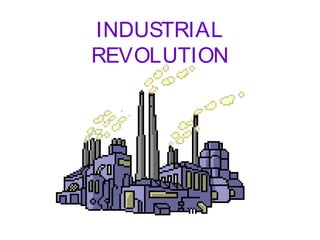
Industrial revolution
- 2. Why did it begin in Great Britain? 1.Farming (more land new crops, better food) 2.Britain had many workers (pop)
- 3. 3. British had money or CAPITAL to invest. 4. ENTREPRENEURS: businessmen who want new opportunities to make money.
- 4. 5. natural resources such as coal, iron, & water for power & shipping. 6. Colonies create markets to sell goods
- 5. 1. 1765: . James Hargreaves- invented spinning jenny- makes thread. Cotton industry grows!!
- 6. Other inventions: 2. 1775: James Watt- improved steam engine- run machines, faster transportation
- 7. 2. Edmund Cartwright- water powered loom-weaves cloth, powered by rivers next to factories
- 8. COAL & IRON 3. Henry Cort invents PUDDLING- process to burn away impurities in iron to make hi quality iron
- 9. 4. 1804: Robert Trevithick 1 steam locomotive st •Creates new jobs, mkts & lowers costs of shipping. Trains go up to 50 mph, build 100s miles of track
- 11. 5. Robert Fulton credited w/ Clermont , 1 steamboat st
- 12. • INDUSTRIAL CAPITALISM- an eco system based on industrial production & new classes developed as a result
- 13. • Factories built. • Owners have shifts to run machines constantly. • Employees work assembly lines, repeating same task. • Fined & beaten for being late
- 14. • Many workers had been farmers & many were women or kids (young as 5) who worked 12-16 hr days, for little pay
- 23. Social Changes New social classes developed: 1. Middle Class were managers, store owners, market planners 2. Industrial Working Class- were factory workers.
- 24. 1. Worked 12- 16 hr days, 6 days a weeks 2. Little pay. 3. Dangerous, loud & dirty conditions
- 25. • Society changed: • Most factory laborers were farmers ( 2/3 were women & kids) • Many moved to the cities • Working class & middle class developed
- 26. • Women paid ½ & were 50% of factory laborers. • Many also work out of home (called a COTTAGE INDUSTRY) doing cleaning, laundry, etc
- 28. NORTH AMERICA Don’t write: Btw 1800-1860 pop grew! • canals & RRs link US • 50% of people live on farms in US, but many moving to the North to work in cities
- 29. How did population change? Urbanization (city growth) factors include: *Pop doubles in Europe. (266 mil) * Less wars & diseases, & better food led to growth. * people come to city to work in factories
- 30. EUROPE BY 1815
- 32. •Living conditions poor in cities •Cheap, crowded, dirty apartments •Rats & trash spread disease, •sewage & poor sanitation
- 34. •Conditions worsen & socialism grows (idea govt should take control of means of production) & Trade unions dev to fight to raise wages, & improve conditions
- 37. • GB, AUS, PRU, RUS meet Sept 1814 for peace settlement at CONGRESS OF VIENNA • Led by Klemens Von Metternich
- 38. •Principle of Legitimacy- restore monarchies to power •Divide territories so that so no one too strong •GB, Rus, Pru Aus, Fr meet to keep peace
- 39. • adopt PRINCIPLE of INTERVENTION- right to send in armies if rev occurs. But Britain refused
- 40. • New ideas: • LIBRALISM-idea people should be free from govt restraint (freedom of speech, separation of church & state, want a constitutional monarchy)
- 41. •NATIONALISM- a unique cultural identity of a people based on a common language, religion, history. Often leads people to want own nation. Starts revolutions, upsets balance of power
- 42. • GERMANY was 38 states (German Confederation) • Rulers promise new constitutions & meet as Frankfort assembly to write one. Draft it, but can’t enforce. • ITALY: 9 states, some owned by Austria. • Revolts break out to create unified Italy w/ liberal constitutions, but Austrians stop it.
- 43. SECOND INDUSTRIAL REVOLUTION
- 44. •DON’T WRITE!!! • Second Industrial Rev lasted from 1870s into 1900s. • 1st rev focused on railroads, iron, coal, and cloth. 2nd focused on:
- 45. 1. Iron replaced by steel- light, strong 2. electricity- heat & light, factories could run 24 hrs 3. chemicals & oil
- 46. NEW 1. telephone in INVENTIONS 1876- Alexander Graham Bell 2. Radio- Guglielmo Marconi 3. Plane- Wright brothers 4. Internal combustion engine- Daimler
- 47. OTHER CHANGES •Wages increased & prices drop due to cheaper transportation & factories
- 48. • Italy, Aus- Hungary, SP, Port & Rus still agricultural, not industrial.
- 49. Top- wealthy 5% of pop own 30-40% of money • Middle Class- Drs, lawyers, civil servants • Lower-middle class- shopkeepers • Lower class- sales people, secretaries. • Working class- 80% of pop (servants, farmers)
- 50. GROCERY STORE late 1800s
- 51. 1. Women- new jobs open up. Create jobs as clerks, secretaries, typists 2. Women work until marriage in working class families. 3. Feminism grows. 4. Can divorce, own property, go to college
- 54. FUN!!!! • People had time & $$$$ for leisure • Pro sports (Reds 1869) • Amusement parks & dance halls open
- 56. CONEY ISLAND’S 1st COASTER
- 66. •State financed schools set up for boys & girls to: •train labor for factories •Increase literacy •Create patriotism
- 67. ORGANIZING THE WORKING CLASS •Karl Marx & Friedrich Engels upset by factory conditions & blame industrial capitalism. •Wrote in Communist Manifesto that:
- 68. COMMUNIST MANIFESTO a.history is a class struggle b. Oppressors or Bourgeoisie are middle class who own means of production (land, $$$) & control govt
- 69. COMMUNIST MANIFESTO c. Oppressed or Proletariat are working class & depend on oppressor d. Huge struggle will occur w/ violent revolution
- 70. KARL MARX e. Proletariat will overthrow bourgeoisie & form dictatorship to organize production.
- 71. KARL MARX f . Creates no social or economic classes or differences .